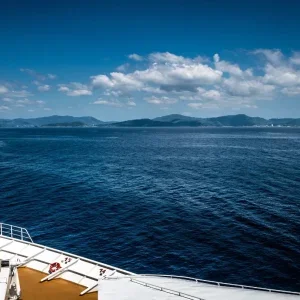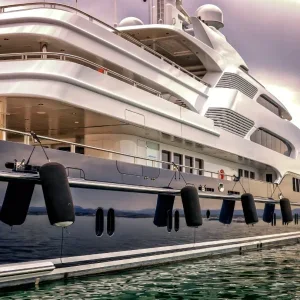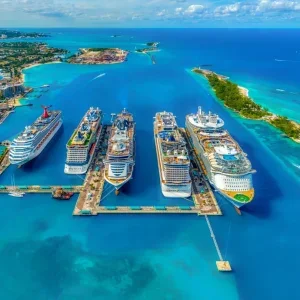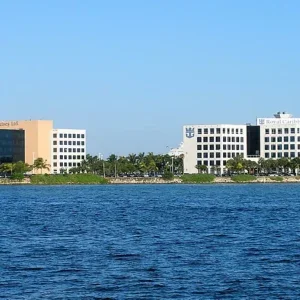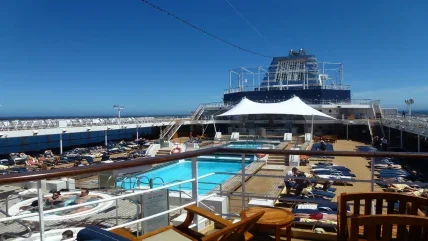
The global cruise industry, renowned for its allure of adventure and luxury, now finds itself navigating through turbulent waters amidst an economic downturn of unprecedented proportions. Once synonymous with opulence and leisure, cruise lines are grappling with a myriad of challenges as they strive to stay afloat in an uncertain economic climate. In this comprehensive analysis, we delve into the intricate dynamics of the economic downturn impacting the cruise industry, examining the multifaceted implications, exploring the underlying factors, and dissecting the strategic responses adopted by industry stakeholders.
Understanding the Economic Downturn
The economic downturn, a confluence of global events ranging from geopolitical tensions to the far-reaching ramifications of the Covid-19 pandemic, has sent shockwaves reverberating across the cruise industry. With economic indicators flashing red and consumer confidence wavering, the repercussions have been keenly felt by cruise operators worldwide. As discretionary spending dwindles and travel restrictions persist, the once bustling decks of luxury liners now echo with uncertainty, prompting industry players to reassess their strategies in the face of adversity.
Impact on Cruise Operators
From industry giants such as Carnival Corporation to boutique cruise lines catering to niche markets, the economic downturn has spared no segment of the cruise industry from its disruptive effects. As voyages were suspended, ports closed, and bookings cancelled, the financial toll on cruise operators became increasingly evident. With revenue streams drying up and operational costs mounting, cruise lines were compelled to make difficult decisions, including fleet downsizing, route cancellations, and workforce reductions, in a bid to stem the tide of losses and safeguard their long-term sustainability.
Consumer Behaviour Shifts
Against the backdrop of economic uncertainty, consumer behaviour within the cruise industry has undergone a profound transformation. Health and safety concerns loom large, casting a shadow over the prospect of embarking on a cruise vacation. The once carefree spirit of exploration has been tempered by apprehension, as travellers weigh the risks against the rewards of sea-bound escapades. Moreover, the tightening of purse strings in the wake of economic downturn has led individuals to reevaluate their spending priorities, further dampening demand for cruise travel and presenting a formidable challenge for industry stakeholders.
Reviving Passenger Confidence
In response to the prevailing climate of uncertainty, cruise lines have embarked on a concerted effort to revive passenger confidence and reignite the flames of wanderlust. Central to these efforts are rigorous health and safety protocols aimed at reassuring travellers of a safe and secure cruising experience. From enhanced sanitation measures to onboard testing facilities and vaccination requirements, cruise lines are leaving no stone unturned in their quest to instil confidence in prospective passengers. Additionally, flexible booking policies, coupled with enticing pricing incentives and value-added offerings, have been rolled out to incentivise bookings and incentivise travellers to set sail once more.
Adapting to Changing Market Dynamics
The economic downturn has necessitated a paradigm shift in the way cruise operators conduct business, prompting a wave of innovation and adaptation to changing market dynamics. Embracing digitalisation and leveraging technology have emerged as key strategies to streamline operations and enhance guest experiences in a post-pandemic world. From contactless check-in procedures and virtual entertainment offerings to personalised onboard experiences tailored to individual preferences, cruise lines are harnessing the power of technology to meet the evolving needs and expectations of modern travellers.
Investing in Sustainability
Amidst the prevailing economic uncertainty, sustainability has emerged as a beacon of hope for the cruise industry, offering a path towards resilience and long-term viability. With mounting environmental concerns and regulatory pressures, cruise lines are increasingly investing in sustainable practices and eco-friendly initiatives. From the adoption of LNG-powered ships and the implementation of advanced waste management systems to the exploration of alternative fuels and renewable energy sources, the industry is charting a course towards a greener and more sustainable future.
Collaboration and Partnerships
In the face of unprecedented challenges, collaboration and partnerships have emerged as linchpins of resilience within the cruise industry. Cruise lines, alongside industry associations, governmental bodies, and destination stakeholders, are forging alliances and fostering dialogue to address shared challenges and chart a course for recovery. From destination revitalisation projects aimed at stimulating tourism economies to infrastructure development initiatives designed to enhance connectivity and accessibility, collaborative efforts are paving the way for a brighter future for the cruise industry and the communities it serves.
Conclusion
In conclusion, the economic downturn has cast a long shadow over the cruise industry, posing formidable challenges to its resilience and sustainability. However, amidst the stormy seas of uncertainty, cruise lines are demonstrating remarkable resilience and adaptability, navigating through uncharted waters with determination and ingenuity. By prioritising health and safety, embracing innovation, and fostering collaboration, the industry is laying the groundwork for a swift and sustainable recovery. As the cruise industry sets sail towards calmer shores, it remains imperative for industry stakeholders to remain vigilant, agile, and committed to charting a course towards a brighter and more prosperous future.


